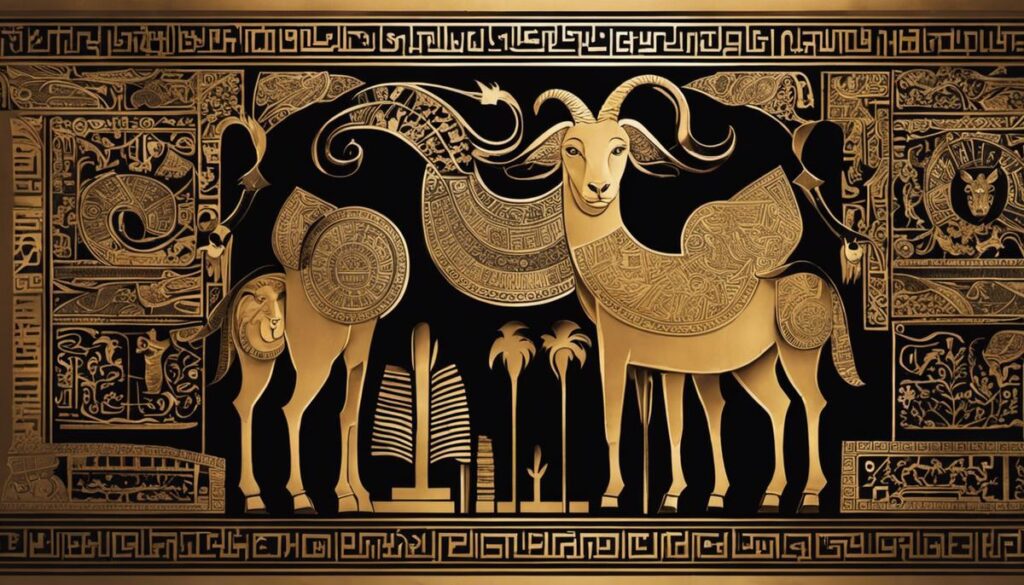In the realm of spiritual discourse, dreams have always been a source of intrigue and perceived divine message. Peculiarly, elements such as the portrayal of dead fish in dreams pique interest, inducing a quest to unravel its symbolism and implications. In Christian scripture and tradition, the symbol of fish embodies profound connotations, commonly identified with abundance, faith, and Christ himself. Conversely, the biblical interpretation of dead fish in dreams emerges as a complex, nuanced subject warranting thorough exploration. This research study delves into the biblical symbolism of fish, the interpretation of dreams within Christianity, and the cross-cultural interpretations of dead fish in dreams, culminating in the biblical understanding of dreaming of a dead fish.
Biblical Symbolism of Fish
The symbolism of fish in the Biblical context holds manifold significance, depth, and complexity; a testament to the rich tapestry woven in the bible through allegory and metaphors profoundly embedded in ancient cultures and customs. Predominantly, being a cornerstone of early Christianity, the symbolism of the fish has traversed through centuries exhibiting both theological and liturgical connotations.
The Greek word for fish, ‘Ichthys,’ became an elaborate acrostic for early Christians during the Roman Empire, representing ‘Iesous Christos Theou Yios Soter,’ or ‘Jesus Christ, Son of God, Savior.’ Scribbled on hideouts’ walls, tombs, or catacombs by early Christians under hostile Roman rule, it served as a cryptic symbol of faith and identification. Hence, the iconography of the fish as a representation of Christ continues to adorn church edifices and Christian paraphernalia today.
In several instances, the fish also symbolizes sustenance, providence, and munificence; vividly portrayed in the miraculous feeding narratives (Matthew 14:13-21, 15:32-39, Mark 6:30-44, 8:1-9, Luke 9:10-17, John 6:1-15), where the fish became emblematic of God’s endless bounty and divine providence.
Moreover, the fish stand as metaphors for the faithful, as observed in Matthew 4:19, where Christ tells his disciples, “Follow me, and I will make you fishers of men.” This allegorical depiction correlates the act of fishing with the apostolic mission of spreading the good news, underpinning the transformative power of divine grace on humanity symbolized by fish.
The symbolism of fish is also strongly connected with the concepts of life and rebirth. In 1 Corinthians 15:39, Apostle Paul alluded to different types of flesh, one of them being that of fish, symbolizing differing embodiments in the afterlife. Additionally, the story of the prophet Jonah in the belly of a large fish for three days and nights signifies a form of death and resurrection.
Biblical symbolism functions as rich literary devices while also serving as vessels of profound theological, spiritual, and cultural conveyances. The symbolism of fish in particular, is an exemplary embodiment of this complexity and depth, intricately tied to Christian doctrine, community identification, provision, evangelism, and metaphysical concepts. Conclusively, the imagery of fish within the biblical narrative is far from a simplistic or linear interpretation. Instead, like all prominent symbols within the text, it carries numerous layers of meaning and continues to open pathways for theological contemplation and discourse.

Dream Interpretation in Christianity
Unraveling Dreams and Theological Interpretation in Christian Thought: From Ichthys to Revelations
The exploration of dreams in the context of Christian theology extends the scope beyond the acrostic depiction of 'Ichthys' and the metaphorical associations of fish in Biblical narratives. A quintessential element that elucidates the theological understanding is the act of ‘dreaming.’ Throughout Christian Scripture, dreams remain a pivotal medium through which divine revelation was manifested, thus making the study of dreams a significant focus in theological discourse.
From the Old Testament to the New Testament, the interpretation of dreams signifies intricate integration of the spiritual realm within ordinary life. It plays an invaluable role in understanding God's divine messages and guidance, often deciphered by prophets or key religious figures like Joseph the son of Jacob, or Daniel in the Babylonian court.
The phenomenon of dreams as a theological instrument can be perennially traced back to Genesis, where Joseph's prophetic dreams triggered a cascade of events, culminating in the preservation of the Israelites. In Numbers, dreams became a conduit of Divine Will where God expressed the intention to communicate through visions and dreams to the prophets. This further underscores the symbolic weight attached to dreams, linking them indelibly with divine revelations and interpretations.
In the New Testament, dreams also emerge as conduits of divine communication. An exemplary instance is the dream of Joseph, the husband of Mary, in which an angel assuaged his concerns about Mary's immaculate conception, thus reinforcing the idea of dreams as vehicles for divine intervention and guidance.
Dreams also shape the apocalyptic literature in Christian theology, affording comprehensive understanding of the divine plane. The Book of Daniel is replete with dream visions, serving as the divine tapestry foretelling unfolding historical events. The Book of Revelation is another testament detailing highly symbolic dream sequences. The vivid dream visions in these books not only project eschatological events but also reflect the recurrent theme of divine truth being unveiled through dreams.
In sum, much like the symbolism of the fish, dreams dominate Christian theological interpretation. They navigate the divine-understandable interface, offering valuable insights into the grand narrative of salvation, divine intervention, and prophecies. While the symbolism of fish delineates the material expression of faith and divine providence, dreams explore the abstract realm of divine revelation and eschatological understandings.
Such paradoxical yet coherently intertwined concepts enrich the scope of Christian theology, highlighting the complexity and the depth of symbolic representation. In digging deeper into this symbolic soil, we encounter the intricate tapestry of Christian theology wrapped meticulously in age-old narratives, waiting to unfold itself to bring forth clarity to human understanding. Thus, an intensive exploration of the role of dreams manifests as an essential element to unlock the voluminous treasure of theological and symbolic studies in Christian discourse.
The terrain of Christian theology thus remains not only embedded in biblical narratives or a sundry of symbols but also in the complex labyrinth of dreams that extend Catholic understanding. As we move forward, a nuanced approach to unravel these dreams or visions will inevitably allow us to delve deeper into the heart of Christian theology, unraveling layers of divinity, prophecies, and the human quest for understanding the divine plan.

Interpreting Dead Fish in Dreams
Continuing our exploration into the fascinating realm of dream interpretation, specifically focusing on dreams involving deceased fish or marine life, it is imperative to first address how dreams generally signify unconscious fears, desires, and aspirations of an individual. Dreaming of dead fish can habitually be traced back to feelings of disappointment or anxiety, possibly related to diminution or transformation.
Expanding on the Christian theological perspective, dreams about dead fish can be viewed as metaphors for spiritual stagnation. Given the biblical contexts, fish symbolize fecundity and life. Therefore, dead fish may denote an inhibited spiritual state, insinuating the necessity for one to revitalize their faith.
Simultaneously, it is important to appreciate the concept of water in the interpretation process. In psychology, water often symbolizes the subconscious mind. Thus, dreaming of dead fish could exemplify feelings of repressed emotions or personal afflictions drowning in the depths of an individual’s subconsciousness.
According to Freudian theory, dream interpretation is inseparable from one’s personal life experiences. Hence, a dream of a dead fish might symbolize past traumatic experiences or childhood memories resurfacing in an adult’s conscious mind. As the fish represents life force in many cultures, the death of fish could signify the end of certain life phases, calling for the dreamer to move forward and accept changes.
From the Jungian perspective, dreams are a mystical window into our collective unconscious, a shared repository of mankind’s experiences. Recognizing fish as archetypal symbols representing life and fertility, witnessing fish death can hint towards a collective emotional state, perhaps stress or anxiety over threats to our ecosystem or global climatic shifts.
While the interpretations of dreams about dead fish are multifarious, they share a common thread: a call for transformation. The themes of spiritual stagnation, suppressed emotions, past trauma, or social anxiety exist not to provoke dread but rather to alert an individual of their need for change, evolution, or acceptance.
Though it is tempting to decode dreams for exact meanings or precise foresights, it is crucial to remember that the interpretation rarely follows a one-size-fits-all methodology. Given that dreams are deeply personal, subjective experiences, interpretations ought to be tailored to the dreamer’s unique context and background.
In closing, delving into deciphering dreams of deceased fish enriches the understanding of human psyche, religious inclinations, and sociocultural significances. It takes explorers on a fascinating journey through individual subconsciousness, biblical implications, and collective angst, unveiling the intricacy of symbolic representation in human cognition, faith, and culture. The beauty of dream interpretation lies in the unity of science and spirituality, deftly woven by the threads of symbolism and faith. Undeniably, this exploration elevates the value of dreams in understanding human existence and adds another layer to the widespread allure of symbolic studies in Christian discourse.

Biblical Interpretation of Dreaming Dead Fish
Encompassing a deep and sophisticated understanding of the symbolic biblical narrative, the Christian interpretation of dreaming about dead fish blurs the line between divine prophecy and the human psyche’s inner workings. With a rich symbolism far more profound than might be initially considered, the image of the deceased fish in a dream is a compelling narrative requiring thoughtful exploration.
Turning to the symbolic framework of Christian theology, the dead fish’s imagery may be viewed as a metaphor for spiritual stagnation or imbalance. As creatures habitually linked with vitality, sustenance, and rebirth, the demise of such creatures in a dream could be indicative of a hiatus in spiritual growth. This spiritual deceleration is, more often than not, regarded as a call to self-reflection and inner exploration. The imagery of lifeless fish urges the individual to identify dormant potentials and fixate on spiritual nourishment, giving rise to a form of spiritual resurrection akin to that symbolized by the fish in early Christianity.
The milieu of a dream involving death or dead creatures, particularly fish, dresses itself in the subjective intricacies of the dreamer’s state of mind. Hence, the study of dreams of dead fish would be incomplete without a nod to classical psychoanalytical theories. Sigmund Freud’s work on dream interpretation provides relevant insight here, suggesting that dreaming about dead fish could unearth past traumas or experiences. Likewise, from a Jungian perspective, dreams are collective unconscious glimpses, encapsulating societal undercurrents.
In context, the water body housing these fish is also symbolically significant, often representing the human subconscious in dream analysis. A tranquil sea may denote a peaceful state of mind, while turbulent waters can reveal internal conflict or emotional tumult.
Interpreting dreams of dead fish inevitably takes us on a transformative journey between theology and psychology. It calls for accepting and reconciling with losses and changes, and creates avenues for profound personal and societal transformations. However, as striking as these common themes may be, dream interpretation remains a highly subjective domain.
In conclusion, the biblical interpretation of dreaming about dead fish, as viewed from a Christian theological perspective, encapsulates an array of symbolic implications. It tangentially touches on divine communication, psychoanalysis, and personal growth, making it a veritable symbol of spiritual stagnation or personal struggles. Delving into such dreams is an insightful means of understanding the labyrinth of human psyche, underlining the need for symbolic and theological studies in contemporary Christian discourse.

Through the in-depth exploration of biblical symbolism, Christian dream interpretation, and cross-cultural dream readings, we have endeavored to elucidate the biblical meaning of dreaming about dead fish. Taking into account psychological perspectives and scientific evidence, the findings expose a profound connection between dreams and the spiritual realm, often asserting a call to action or spiritual awakening. As dream symbolism often defies cut-and-dried interpretations, acknowledging the diverse perspectives and ongoing debates reinforce the inherent complexity surrounding this intriguing subject matter. Regardless of one’s standpoint, it is undeniable that the quest to comprehend our dreams perpetually illuminates new dimensions of our spiritual consciousness.








